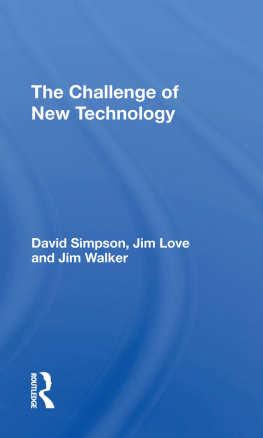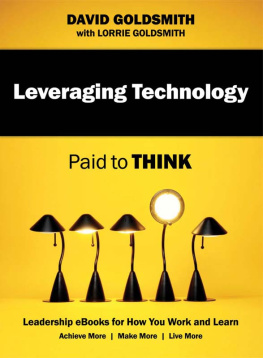First published 1987 by Westview Press, Inc.
Published 2019 by Routledge
52 Vanderbilt Avenue, New York, NY 10017
2 Park Square, Milton Park, Abingdon, Oxon OX14 4RN
Routledge is an imprint of the Taylor & Francis Group, an informa business
Copyright 1987 David Simpson, Jim Love, Jim Walker
All rights reserved. No part of this book may be reprinted or reproduced or utilised in any form or by any electronic, mechanical, or other means, now known or hereafter invented, including photocopying and recording, or in any information storage or retrieval system, without permission in writing from the publishers.
Notice:
Product or corporate names may be trademarks or registered trademarks, and are used only for identification and explanation without intent to infringe.
British Library Cataloguing in Publication Data
Simpson, David, 1936
The challenge of new technology.
1. Technological innovations Social aspects I. Title II. Love, J. III. Walker, Jim
303.4'83 T173.8
ISBN 13: 978-0-367-29063-4 (hbk)
There is a vast literature, whose rate of output shows no sign of diminishing, of forecasts of the consequences of new technology. These forecasts are for the most part written by scientists, technologists and engineers, and their distinguishing characteristic is a lack of uncertainty about the future. The role of the human factor in the implementation of the technology is also noticeable by its absence.
The present book differs from such literature in two important respects. It does not deal in speculations about the future; instead it looks at what has actually happened when new technology has been deployed in an industrial and commercial environment. Secondly, it is written by economists, who are perhaps less sanguine about the predictability of human behaviour than their colleagues in the natural sciences. The book starts from the assumption that the social and economic consequences of new technologywhether for good or for evilwill depend on decisions made by human beings, whether as individuals, or as members of such collective groups as firms, departments of government, households, trade unions and other organisations. The advent of new technology creates challenges for individuals and organisations in the shape of opportunities for gain and prospects of loss. In this book, we set out to identify some of the effects which have been evident hitherto, as well as some of the challenges.
The book is built on two foundations. The authors have spent more than three years surveying the effects of the deployment of new technology in industry and commerce. In the course of this survey, more than 240 interviews, each of approximately 40 minutes' duration, with managers, shopfloor workers, trade union representatives and office staff were carried out and recorded on tape. We conducted the interviews in eight firms in each of five industries: electronics, printing, engineering, consumer goods and financial services. The firms that we interviewed ranged in ownership type from state-owned through multinational to private unquoted companies, and in size from employing 14 to employing 8000 people. The interviews were carried out in 1984 and 1985. While all of these interviews were conducted in the United Kingdom, we are reasonably confident that most of our conclusions apply generally to the industrialised economies of the world, which are converging fast not only in their technology but also in their patterns of economic and social behaviour.
Secondly, we have tried to read as much of the worthwhile English-language literature on our subject as we were able, although no doubt much valuable material has escaped our attention. We have therefore borrowed unashamedly from other people's ideas. We should like to believe that the book represents a reasonably balanced presentation of the relevant facts and opinions seen critically from different points of view and informed by our own experience.
In terms of method we have followed the example of Rosabeth Kanter, who wrote: 'in making choices about what material to use to express and delineate my ideas, I lean towards rendering those dramas of life in the corporation which would make my conclusions come alive, which would cause readers to believe me, not because of my numbers but because of the echoes of my ideas in their own experience.'
Although there is a list of references and suggestions for further reading at the end of this book, we cannot possibly acknowledge all the intellectual debts which we have incurred. There are, however, some particularly influential works, upon whose ideas we have drawn freely, and which we now acknowledge formally: Simon Nora, The Computerisation of Society; Peter Drucker, Innovation and Entrepreneurship; J. Northcott, M. Fogarty and M. Trevor, Chips and Jobs; N. Rosenberg, Inside the Black Box ; P. Large, The Micro Revolution Revisited; E. Braun and S. Macdonald, Revolution in Miniature ; and T. Forester (ed.), The Information Technology Revolution.
There are a number of individuals whose advice and encouragement we should also like to acknowledge. We should like to thank Sir Bruce Williams, Director of the Technical Change Centre, London, during the period of this study. We should also have liked to have mentioned the names of other individuals who were particularly helpful to us during the survey period. Unfortunately to name them would be to disclose the identity of some of the firms which took part, and we have made it a rule to respect the confidentiality of every interviewee. To them and to all those who helped us we can only express our heartfelt thanks for their time and trouble.
To two colleagues who took part in our project at an earlier stage, Robert Crawford and Frank Harrigan, we should also like to express our thanks. Robert Crawford made such a large contribution to this project that he would have been justified in being included as a co-author, a privilege which he has unselfishly relinquished. Another colleague, John Scouller, kindly allowed us to look at the manuscript of his forthcoming book on industrial policy. Needless to say, none of the people mentioned bears any responsibility for the opinions expressed in this book, or for any errors of fact. These remain the sole responsibility of the authors.
We should like to express our particular appreciation to the Trustees of the Leverhulme Trust, without whose financial support our project would not have been possible.
Finally, we should like to thank Mrs Jean Nelson for preparing and revising early drafts of this manuscript.
The Fraser of Allander Institute
and Department of Economics,
University of Strathclyde.
David Simpson
Jim Love
Jim Walker
July 1986
Notes
R. M. Kanter (1983), pp. 384, 385.










![Kyle Simpson [Kyle Simpson] - You Don’t Know JS: Up & Going](/uploads/posts/book/121420/thumbs/kyle-simpson-kyle-simpson-you-don-t-know-js.jpg)


